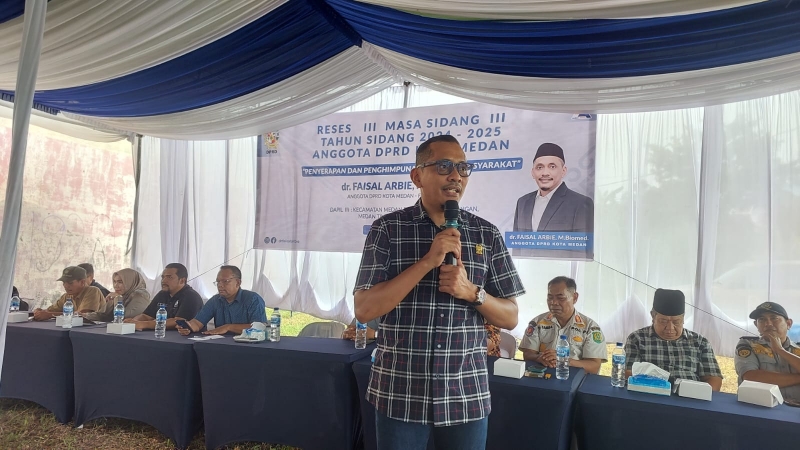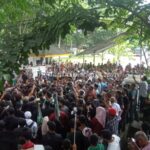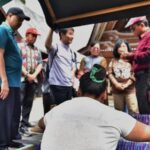Residents of Titipapan Village, Medan Deli District, have raised concerns about the difficulty for BPJS Health patients to obtain inpatient rooms in several private hospitals in Medan City. Hospitals often claim that inpatient rooms are fully occupied and cannot accommodate more patients.
This statement was made by a resident during the Recess III activity of the Third Session of the 2024-2025 Term held in Jalan Platina Raya, Taman Citra Complex (Lingkungan 1 Field), Titipapan Village, Medan Deli District, Medan City.
“Regarding inpatient services at hospitals, if we are BPJS patients, they always say there are no available rooms. It’s very difficult just to get admitted. Please ensure that we, the public, receive proper service,” said the resident.
In response, a NasDem Party politician stated that hospitals indeed have limited rooms for BPJS Health patients. This is because not all inpatient rooms in BPJS-affiliated hospitals are allocated for BPJS patients.
“For example, if Hospital A has 150 beds, not all are allocated for BPJS. Usually, out of 150 beds, only 100 are designated for BPJS patients, while the rest are for general patients. That’s why BPJS patients are often told rooms are full, while general patients may still find availability,” the politician explained.
However, the politician emphasized that hospitals cannot use full occupancy as an excuse to reject BPJS patients or ask them to seek treatment elsewhere.
“I must clarify: if a hospital is full, it is not the patient’s or their family’s responsibility to find another hospital. It is the hospital’s duty to arrange a room elsewhere. While waiting for availability, patients must still be treated, even if temporarily placed in non-BPJS rooms,” they added.
Moving forward, if any hospital continues to reject BPJS patients citing full occupancy, the public is encouraged to report the issue directly.
“If any hospital turns patients away, report it immediately, and my team will assist,” the politician stressed during the event, which was attended by local officials and representatives from relevant agencies.
A BPJS Health representative in Medan, Imam, confirmed that hospitals are responsible for arranging alternative inpatient rooms if their own are full.
Additionally, the public can now check room availability in hospitals through the Mobile JKN app.
“We now have the Mobile JKN app, which provides real-time bed availability data. Each hospital also has BPJS officers on-site. If issues arise, report them to our officers there,” Imam explained.
Beyond healthcare concerns, residents also raised issues about frequent traffic congestion at the Titipapan intersection.
“Traffic at the Titipapan gate is severe. The alternative route through Kota Bangun is always jammed, causing many of us to be late for work,” complained a resident.
Another resident, Atin from Taman Citra, highlighted the loss of green spaces due to construction, reducing water absorption areas in the neighborhood.
Meanwhile, Wagimin, another resident, expressed frustration over the neglected condition of roads in Lingkungan 13, Titipapan Village.
In response to all complaints, the politician urged attending government agencies to provide solutions and committed to overseeing the resolution of these issues.
“All these concerns will be monitored. We hope for prompt and satisfactory resolutions,” they concluded.
Medan City Council
The Medan City Council (Dewan Perwakilan Rakyat Kota Medan) is the legislative body of Medan, Indonesia, responsible for local governance, budgeting, and policy-making. Established alongside the city’s development, it plays a key role in representing the interests of Medan’s diverse population. The council operates within Indonesia’s democratic framework, reflecting the city’s growth as a major economic and cultural hub in Sumatra.
Jalan Platina Raya
Jalan Platina Raya is a major road located in the industrial and business area of Bekasi, West Java, Indonesia. It is known for its proximity to manufacturing hubs, commercial zones, and residential developments, reflecting Bekasi’s rapid urbanization. While not a historical or cultural landmark, the road plays a key role in supporting the region’s economic growth and infrastructure.
Taman Citra Complex
Taman Citra Complex is a residential and commercial area located in Kuala Lumpur, Malaysia, known for its mix of housing, shops, and dining options. Developed in the late 20th century, it serves as a convenient urban neighborhood with easy access to major roads and public transport. While not a historical site, it reflects the growth of suburban Kuala Lumpur as a modern, multicultural hub.
Lingkungan 1 Field
“Lingkungan 1 Field” appears to be a local community or recreational area, possibly in Indonesia (given the term *Lingkungan*, meaning “neighborhood” in Indonesian). While specific historical details are unclear, such fields often serve as gathering spaces for sports, events, or social activities, reflecting the cultural importance of communal areas in Indonesian villages or urban neighborhoods. If referring to a particular historical or cultural site, additional context would be needed for a more precise summary.
Titipapan Village
Titipapan Village is a traditional Dayak village located in East Kalimantan, Indonesia, known for its rich cultural heritage and connection to indigenous Dayak traditions. The village offers insights into the Dayak people’s way of life, including their longhouses, traditional crafts, and rituals. While specific historical records may be limited, Titipapan remains an important cultural site preserving the customs and communal lifestyle of the Dayak community.
Medan Deli District
Medan Deli District is a historic area in Medan, North Sumatra, Indonesia, known for its colonial-era heritage tied to the Deli Sultanate and Dutch plantation industry. Once the center of the lucrative tobacco trade in the late 19th and early 20th centuries, it features landmarks like the Maimun Palace and old Dutch buildings. Today, it reflects a blend of Malay, Dutch, and local cultures, showcasing Medan’s rich multicultural past.
Mobile JKN app
The **Mobile JKN app** (Mobile Jaminan Kesehatan Nasional) is an official application developed by Indonesia’s BPJS Kesehatan to provide easy access to the country’s national health insurance services. It allows users to check their membership status, claim benefits, find healthcare facilities, and manage health data digitally. Launched to improve healthcare accessibility, the app reflects Indonesia’s efforts to modernize and streamline its public health services under the JKN program, which began in 2014.
Kota Bangun
Kota Bangun is a small town located in Kutai Kartanegara Regency, East Kalimantan, Indonesia, known for its proximity to the Mahakam River and its historical role as a trading post. The area has cultural significance for the local Dayak and Kutai communities and was once part of the Kutai Sultanate, one of Indonesia’s oldest Hindu kingdoms. Today, it serves as a gateway to nearby natural attractions, including wetlands and traditional villages.






